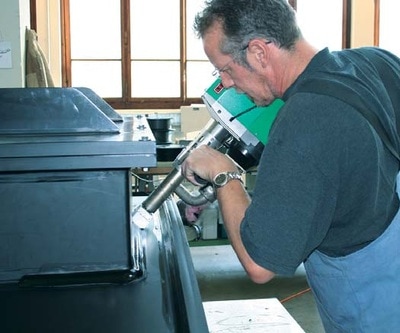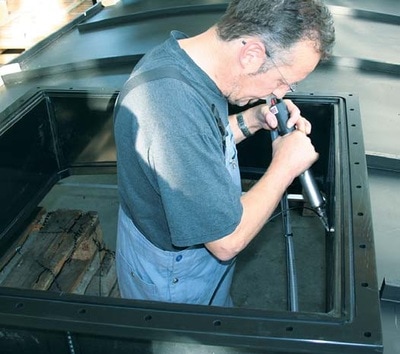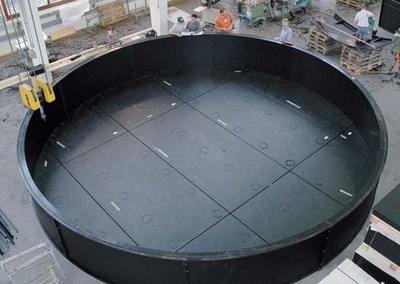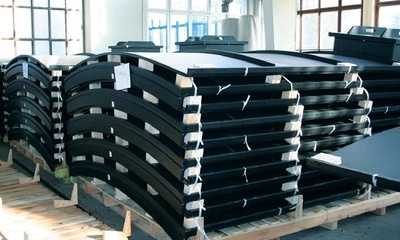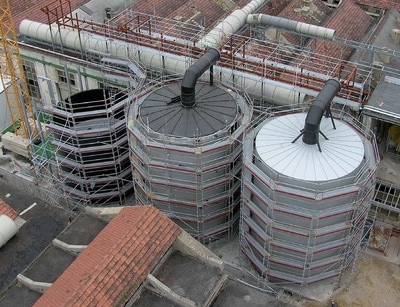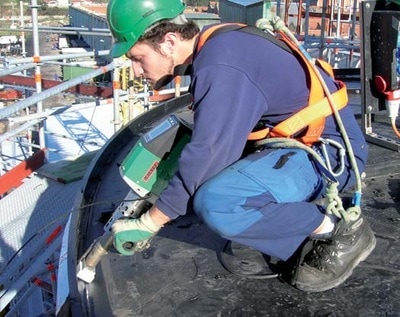|
From Switzerland to the Basque Country Thun, Switzerland, September 2006. In an otherwise empty industrial building, previously used by the Swiss army, big things are emerging: The company Colasit from the Berner Oberland region of Switzerland leased the building on a temporary basis. 25 mm thick polyethylene panels were prefabricated for their subsequent assembly in Spain. Three massive silos were built in the Basque Country, as commissioned by the German company «m+w Zander Gebäudetechnik GmbH»; these are now used in the biological washing process. They were integrated into a cellulose production plant. Using this technique, organic airborne pollutants are now extracted biologically in a multi-stage process. The waste gases flow through packed beds, are absorbed on the surface of substrate substances and are decomposed by microorganisms. The bio-washer results in a considerable reduction in odour and pollutant emissions. The population of Torrelavega and the surrounding region therefore waited eagerly for the plant to be commissioned. Perfect processing down to the smallest detail Each silo consists of four stacked arrays, each with ten wall elements. The panels of the three upper arrays are 3.8 m high, 2.67 m wide and weigh 300 kg, those in the lowest array are half the dimensions. In Thun, Switzerland, they were firstly mounted on a fixture device with a 4.25 m radius. In order to maintain the curvature, arch struts slot-milled on both sides were mounted of the upper edge of the panels and extrusion joined on the inside and outside. The 210 to 230° hot extruded material was delivered by powerful WELDPLAST EC4 and S4 hand extruders from Leister (EC4 with brushless motors for worm drive and hot air). Three inspection hatches and a manhole were also welded on the curved PE panels. The Leister hand extruders also proved themselves equal to this awkward task. To ensure that the hatches did not deform while the extrusion material cooled, the covers were screwed on temporarily after welding. As a fixture aid for the insulation to be mounted later in Spain, four horizontal struts were also mounted on the outside of the individual elements. Here a simple welding seam was sufficient. The 4 mm thick welding seam was produced with the DIODE S hand tool from Leister. Systematic assembly Leister tools were also used in the final assembly phase in the Basque Country: Around 10 Colasit employees welded around the clock, 6 days a week using the WELDPLAST S4and EC4 (brushless) extruders. With an output rate of up to 4 kg/h, joining of the parts proceeded apace. The individual panels were mounted in a ring structure and were screwed together on the sides. The vertical joints were then welded. Once the first array was finished, the panels for the second array were inserted into the slot of the lower array offset to the side and were extrusion joined on the inside and outside of the panels. The base and roof segments made of PE were also welded to the wall elements in Spain. Hard labour The three completed silos boast impressive dimensions: wall height 13.5 m, diameter 8.5 m, circumference 26.7 m. The plastics specialist from Colasit processed 45 tons of PE panels in total. The total welding seam length amounted to around 5 km! When the production plant in Spain goes into operation, each of the three silos filled with 510 m3 wash packing and water weighs around 200 tons. No question that the strength of the joints is subject to extraordinary demands. Demands that Colasit’s professional workmanship clearly meet, not least thanks to the high welding quality using Leister hand extruders. Realization under time pressure For Colasit, this contract was one of the biggest in its company history going back over 60 years. Besides the logistics challenge, the tight schedule also had to be observed: In just 5 months, all the prefabricated elements had to be ready, transported to Spain on nine lorries, the three silos built up and the complete system connected with the cellulose production plant. Interview with Bernhard Schaufelberger, Head of Production at Colasit Mr. Schaufelberger: What was your experience with the new Leister hand extractors in this complex and demanding contract? The new hand extruders are very effective. With such large components as were used here, this has a major impact on the manufacturing time. The twist-free rod feed is another advantage: Long sections can be extruded without a break. The compact design without a bulky transformer box and heavy cables is especially welcome with the new tools. They feel very comfortable in your hand as a result. Working with the WELDPLAST EC4 is especially pleasant, as the drive motor runs extremely quietly. What do you think about the technical design of the tools? Technically they are absolutely mature. The sophisticated display allows optimal monitoring all the time and the control of all the relevant welding parameters. The synchronous motor provides for uniform extruding material output and therefore perfect welding results. What has been your experience with Leister? We have worked with Leister for the past 10 years and value the high quality of the tools, as well as the good and prompt service. That’s why we only use Leister hand tools for welding in our production plant in Spiez (Switzerland). It is, of course, a great advantage to source hand tools, blowers and now hand extruders from the same supplier. As a user company, Colasit was an important partner in the design and development of the new hand extruders. How did you experience this period? Through our close relationship with Leister, we were able to implement optimization proposals during the development process of the new hand extruder, which were then also put into effect and are now proving themselves in practice. Client: m+w Zander Gebäudetechnik GmbH, Nuremberg, D
Plastic Products: COLASIT AG, Spiez, CH, www.colasit.ch Author: Christophe von Arx, Leister Process Technologies End customer: Sniace, cellulose production, Torrelavega, ES Equipment supplier: Leister Process Technologies, Sarnen, CH, www.leister.com Comments are closed.
|
|
STANMECH Technologies Inc.
944 Zelco Drive Burlington ON L7L 4Y3 | 1-888-438-6324 | [email protected] Terms of Use Privacy Terms and Conditions of Sale Warranty Policies |
|
Proud Member of:

